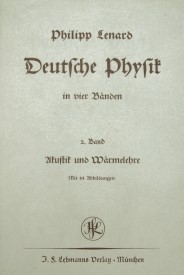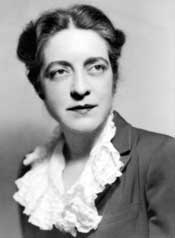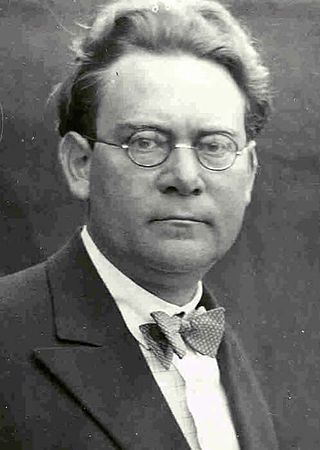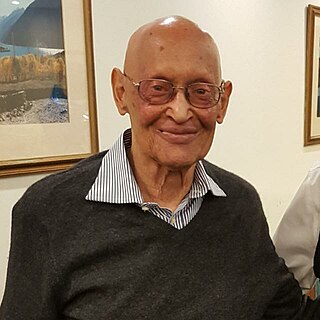Richard "Rich" Wolfson (born 1950) is the Benjamin F. Wissler professor of Physics at Middlebury College [1] since 1976. [2]
Contents
He is the author of numerous articles and books.
Wolfson has taught several courses at the Teaching Company. [3]
Richard "Rich" Wolfson (born 1950) is the Benjamin F. Wissler professor of Physics at Middlebury College [1] since 1976. [2]
He is the author of numerous articles and books.
Wolfson has taught several courses at the Teaching Company. [3]
Professor Wolfson is the author of several books, including the college textbooks Physics for Scientists and Engineers, Essential University Physics, and Energy, Environment, and Climate. He is also an interpreter of science for the nonspecialist, a contributor to Scientific American , and author of the books Nuclear Choices: A Citizen's Guide to Nuclear Technology and Simply Einstein: Relativity Demystified. [3]

Albert Einstein was a German-born theoretical physicist, widely acknowledged to be one of the greatest and most influential physicists of all time. Einstein is best known for developing the theory of relativity, but he also made important contributions to the development of the theory of quantum mechanics. Relativity and quantum mechanics are the two pillars of modern physics. His mass–energy equivalence formula E = mc2, which arises from relativity theory, has been dubbed "the world's most famous equation". His work is also known for its influence on the philosophy of science. He received the 1921 Nobel Prize in Physics "for his services to theoretical physics, and especially for his discovery of the law of the photoelectric effect", a pivotal step in the development of quantum theory. His intellectual achievements and originality resulted in "Einstein" becoming synonymous with "genius". Einsteinium, one of the synthetic elements in the periodic table, was named in his honor.

Satyendra Nath Bose was an Indian mathematician and physicist specializing in theoretical physics. He is best known for his work on quantum mechanics in the early 1920s, in developing the foundation for Bose statistics and the theory of the Bose condensate. A Fellow of the Royal Society, he was awarded India's second highest civilian award, the Padma Vibhushan, in 1954 by the Government of India.

Kip Stephen Thorne is an American theoretical physicist known for his contributions in gravitational physics and astrophysics. A longtime friend and colleague of Stephen Hawking and Carl Sagan, he was the Richard P. Feynman Professor of Theoretical Physics at the California Institute of Technology (Caltech) until 2009 and is one of the world's leading experts on the astrophysical implications of Einstein's general theory of relativity. He continues to do scientific research and scientific consulting, most notably for the Christopher Nolan film Interstellar. Thorne was awarded the 2017 Nobel Prize in Physics along with Rainer Weiss and Barry C. Barish "for decisive contributions to the LIGO detector and the observation of gravitational waves".
Petr Beckmann was a professor of electrical engineering who became a well-known advocate of libertarianism and nuclear power. Later in his life he disputed Albert Einstein's theory of relativity and other accepted theories in modern physics.

In physics, mass–energy equivalence is the relationship between mass and energy in a system's rest frame, where the two quantities differ only by a multiplicative constant and the units of measurement. The principle is described by the physicist Albert Einstein's famous formula: . In a reference frame where the system is moving, its relativistic energy and relativistic mass obey the same formula.

Deutsche Physik or Aryan Physics was a nationalist movement in the German physics community in the early 1930s which had the support of many eminent physicists in Germany. The term was taken from the title of a four-volume physics textbook by Nobel laureate Philipp Lenard in the 1930s.

Leopold Infeld was a Polish physicist who worked mainly in Poland and Canada (1938–1950). He was a Rockefeller fellow at Cambridge University (1933–1934) and a member of the Polish Academy of Sciences.

Melba Newell Phillips was an American physicist and pioneer science educator. One of the first doctoral students of J. Robert Oppenheimer at the University of California, Berkeley, Phillips completed her Ph.D. in 1933, a time when few women pursued careers in science. In 1935 Oppenheimer and Phillips published their description of the Oppenheimer–Phillips process, an early contribution to nuclear physics that explained the behavior of accelerated nuclei of radioactive hydrogen atoms. Phillips was also known for refusing to cooperate with a U.S. Senate judiciary subcommittee's investigation on internal security during the McCarthy era that led to her dismissal from her professorship at Brooklyn College, where she was a professor of science from 1938 until 1952.

Hans Reichenbach was a leading philosopher of science, educator, and proponent of logical empiricism. He was influential in the areas of science, education, and of logical empiricism. He founded the Gesellschaft für empirische Philosophie in Berlin in 1928, also known as the “Berlin Circle”. Carl Gustav Hempel, Richard von Mises, David Hilbert and Kurt Grelling all became members of the Berlin Circle.

Robert M. Wald is an American theoretical physicist and professor at the University of Chicago. He studies general relativity, black holes, and quantum gravity and has written textbooks on these subjects.
Robert Resnick was a physics educator and author of physics textbooks.

Lillian Rosanoff Lieber was a Russian-American mathematician and popular author. She often teamed up with her illustrator husband, Hugh Gray Lieber, to produce works.
John S. Rigden was an internationally renowned American physicist. His areas of expertise were molecular physics and the history of science. He was the former co-editor of the scholarly journal Physics in Perspective, published by Birkhäuser Publishing in Basel, Switzerland. Rigden died November 24, 2017, of cardiac arrest at St. Luke's Hospital in St. Louis. He was 83.

Asghar QadirHI, SI, FPAS, is a Pakistani mathematician and a prominent cosmologist, specialised in mathematical physics and physical cosmology. Asghar has made substantial efforts for promoting Relativity in Pakistan. He has mentored several graduate students throughout his career and also served on important administrative positions, which include being the Chairman of the Mathematics Department at Quaid-i-Azam University, Islamabad, and later the Dean of Faculty of Natural Sciences at the same university. Professor Qadir formed the Center for Advanced Mathematics & Physics at the National University of Science and Technology, in 2004, served as its founding Director General until 2011 and as Professor Emeritus until 2019. He is considered one of the top mathematicians in Pakistan. He is currently working as a visiting professor at Abdus Salam School of Mathematical Sciences, Government College University, Lahore.

Chad Orzel is a professor of physics and science author, noted for his books How to Teach Quantum Physics to Your Dog, which has been translated into 9 languages, and How to Teach Relativity to Your Dog. Chad as a science communicator is a regular contributor on Forbes.com, on his personal website, and, through October 2017, on ScienceBlogs.com, while continuing his work as an associate professor at Union College.
Vlatko Vedral is a Serbian-born physicist and Professor in the Department of Physics at the University of Oxford and a Fellow of Wolfson College, Oxford. Until the summer of 2022 he also held a joint appointment at the Centre for Quantum Technologies (CQT) at the National University of Singapore. He is known for his research on the theory of quantum entanglement and quantum information theory. He has published numerous research papers, which are regularly cited, in quantum mechanics and quantum information, and was awarded the Royal Society Wolfson Research Merit Award in 2007. He has held a lectureship and readership at Imperial College, a professorship at Leeds and visiting professorships in Vienna, Singapore (NUS) and at the Perimeter Institute for Theoretical Physics in Canada. He is the author of several books, including Decoding Reality.
Arthur I. Miller is Emeritus Professor of History and Philosophy of Science at University College London. He took a PhD in physics at the Massachusetts Institute of Technology. From 1991 to 2005 he was Professor of History and Philosophy of Science at University College London (UCL). At UCL, Professor Miller helped restructure an academic unit combining history and philosophy of science, sociology of science, and science communication to create UCL Department of Science and Technology Studies, renamed in 1994. He was instrumental in developing the UK's first undergraduate single honours BSc degree in History and Philosophy of Science, at UCL, launched in 1993.
Moshe Carmeli was the Albert Einstein Professor of Theoretical Physics, Ben Gurion University (BGU), Beer Sheva, Israel and President of the Israel Physical Society. He received his D.Sc. from the Technion-Israel Institute of Technology in 1964. He became the first full professor at BGU's new Department of Physics. He did significant theoretical work in the fields of cosmology, astrophysics, general and special relativity, gauge theory, and mathematical physics, authoring 4 books, co-authoring 4 others, and publishing 128 refereed research papers in various journals and forums, plus assorted other publications. He is most notable for his work on gauge theory and his development of the theory of cosmological general relativity, which extends Albert Einstein's theory of general relativity from a four-dimensional spacetime to a five-dimensional space-velocity framework.
Felix Arnold Edward Pirani was a British theoretical physicist, and professor at King's College London, specialising in gravitational physics and general relativity. Pirani and Hermann Bondi wrote a series of articles that established the existence of plane wave solutions for gravitational waves based on general relativity.